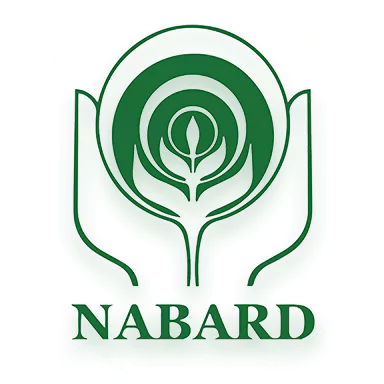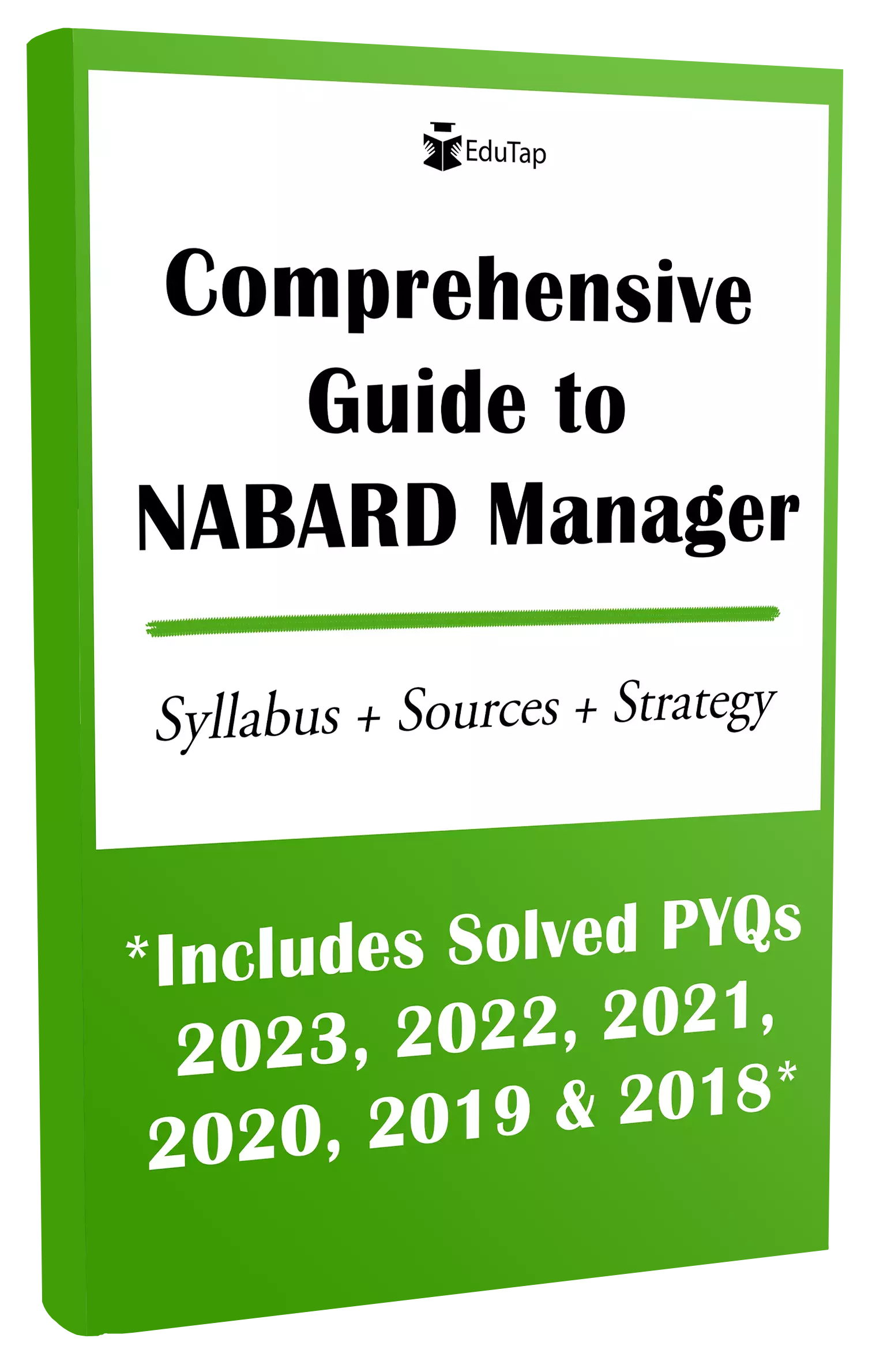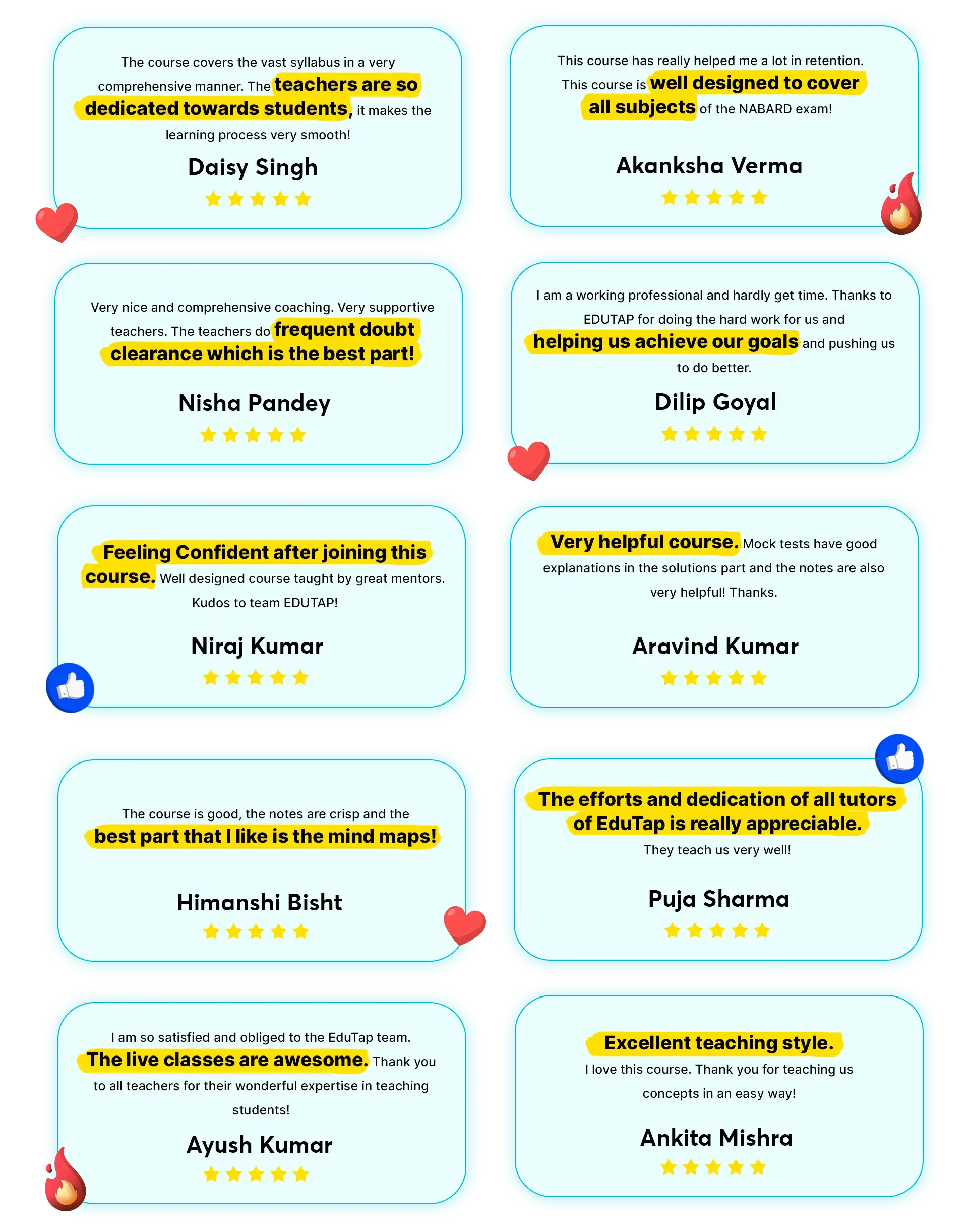
NABARD
Grade A 2024
Know All Details Below

Solved Previous Year Questions Of NABARD Grade A
We have made these question papers available for you in PDF format. You can click on the below links and download the memory based previous year question papers of NABARD Grade A examination of phase 1 and 2 as PDF files.

Get Your Free Copy
When will the NABARD Grade A 2024 notification be released?
Based on the trends of the last three years, you can expect the NABARD Grade A 2024 notification to be released around August or September 2024. However, it’s important to note that there is no official confirmation available at the moment.
How many vacancies are expected in the NABARD Grade A 2024 recruitment notification?
Based on the trends of the last three years, you can anticipate about 150+ vacancies in the 2024 recruitment notification for assistant managers. However, it’s important to note that there is no official confirmation available at the moment
What are the expected exam dates for the NABARD Grade A 2024 recruitment?
As per the previous year’s trends, the expected exam dates are as below.
|
S.No. |
Event |
Tentative Dates |
|
1 |
NABARD Grade A 2024 Notification |
August/September 2024 |
|
2 |
Online Application Start Date |
August/September 2024 |
|
3 |
Online Application Last Date |
September/October 2024 |
|
4 |
Phase 1 (Preliminary) - Online Exam |
September/October 2024 |
|
5 |
Phase 2 (Mains) - Online Exam |
October/November 2024 |
However, it’s important to note that there is no official confirmation available at the moment.
What is the Eligibility for NABARD Grade A 2024 Examination?
The age eligibility for the NABARD Grade A exam is based on the cut-off mentioned in the notification, which is the 1st of the month of the notification year. Based on the same, you must be a minimum of 21 years and a maximum of 30 years of age on or before the cut-off date.
Age Limits
(As 01-09-2024) – 21 to 30 Years
Relaxation in Age Limit –
✅ 03 years in case of eligible OBC applicants
✅ A maximum of 05 years in case of : (i) Applicants belonging to SC/ST , if the posts are reserved for them (ii) Ex-servicemen (including Emergency Commissioned Officers/Short Service Commissioned Officers) provided that the applicants have rendered at least five years continuous Military Service and have been released on completion of assignment (including those whose assignment is due to be completed within one year) otherwise than by way of dismissal or discharge on account of misconduct or inefficiency or on account of physical disability or have been released on account of physical disability attributable to Military Service or on invalidation (iii) Emergency Commissioned Officers/Short Service Commissioned Officers who have completed their initial period of assignment of five years of Military Service but whose assignment has been extended beyond five years and in whose case, on selection, the Ministry of Defence issues certificates that they would be released within 03 months from the date of receipt of offer of appointment, (iv) Children/family members of victims died in the 1984 riots.
✅ 10 years for PWBD (General); 13 years for PWBD (OBC) and 15 years for PWBD (SC/ST) applicants.
Minimum Education Qualification
Officers in Grade ‘A’ (RDBS) – (General)
• Bachelor’s Degree in any subject from a recognized University with a minimum of 60% marks (SC/ST/PWBD applicants – 55%) in aggregate OR Post Graduate degree, MBA/PGDM with a minimum of 55% marks (SC/ST/PWBD applicants – 50%) in aggregate OR CA/ CS/ICWA OR Ph.D from Institutions recognized by GOI/UGC
What is the Salary, Job Profile and Career Progression of NABARD Grade A Officer?
NABARD offers one of the most handsome payrolls available in government jobs.
Pay Scale
- Basic pay of ₹44,500/-p.m. in the pay scale of ₹ 44500 – 2500 (4) – 54500 – 2850 (7) – 74450 – EB – 2850 (4) – 85850 – 3300(1)- 89150 (17 years)
- Officers will also be eligible for Dearness Allowance, Local Compensatory Allowance, House Rent Allowance, and Grade Allowance as per rules in force from time to time.
- At present, initial monthly gross emoluments are approximately ₹ 1,00,000/-
Perks
- Bank’s accommodation, subject to availability
- Reimbursement of expenses for maintenance of vehicle for official purpose,
- Newspaper, Telephone charges, Book grant, allowance for furnishing of residence, etc. as per eligibility.
- Free dispensary facility besides reimbursement of medical expenses for OPD treatment/hospitalization as per eligibility.
- Loans and Advances at concessional rates of interest for Housing, Car, Education of children, Consumer articles, Personal computer, etc.
What is the Exam Pattern for NABARD Grade A Examination?
Officers in Grade A cadre of the National Bank for Agriculture and Rural Development are recruited through a 3 stage recruitment process –

Phase 1 Examination (Preliminary exam)

Phase 2 Examination (Mains exam)

Interview
Phase 1 Examination Details:
✅ The Phase 1 examination or the preliminary examination is a single paper comprising 200 Questions and 200 Marks.
✅ The overall duration of this paper is 120 minutes i.e. 2 hours. Please note that there is no sectional timing.
✅ For every wrong answer marked, 1/4th of the marks assigned to that question are deducted as a penalty.
The Phase 1 Stage of the NABARD Grade A Examination has the following 8 sections:
| Section | No of Questions | Max Marks |
|---|---|---|
| Test of Reasoning | 20 | 20 |
| English Language | 30 | 30 |
| Computer Knowledge | 20 | 20 |
| Quantitative Aptitude | 20 | 20 |
| Decision Making | 10 | 10 |
| General Awareness | 20 | 20 |
| Economic and Social Issues (With focus on Rural India) | 40 | 40 |
| Agriculture and Rural Development with emphasis on Rural India | 40 | 40 |
| Total | 200 | 200 |
• Qualifying Sections – Reasoning, English Language, Computer Knowledge, Quantitative Aptitude, Decision Making
• Merit Sections – General Awareness, Economic & Social Issues (with focus on Rural India), Agriculture & Rural Development with Emphasis on Rural India
• Shortlisting of the candidates for the Main exam is based on marks scored in the Merit section only
Phase 2 Examination Details:
The Phase 2 Examination of NABARD Grade A for the Post of Generalists consists of 2 Papers of 100 Marks each.
| Name of Paper | Type of Paper | Time (Minutes) | No. of Questions | Marks |
|---|---|---|---|---|
| Paper-I: General English | Online Descriptive | 90 | 3 | 100 |
| Paper-II: Economic and Social Issues and Agriculture and Rural Development | 50% Objective 50% Descriptive | 30 Min 90 Min (Total-120) | 30 Objective 04 Descriptive | 100 |
• The calling ratio to qualify for the main examination and interview is a maximum of 1:25 and 1:3, respectively.
• The ratio may be suitably reduced at the discretion of the bank.
• Candidates who qualify and rank sufficiently high as decided by NABARD, shall be called for appearing at the Main Examination and Interview.
• There is a penalty for wrong answers marked by the candidate. For every wrong answer marked, 1/4th of the marks assigned to that question are deducted as penalty in Phase-I and Phase-II, both.
• Cut-offs in Phase-I and Phase-II can be applied in two stages: (i) On scores in individual tests, (ii) On Total Score
Phase 3 Details:
The Phase-III of the NABARD Grade A Examination Consists of an Interview.
✅ Candidates are shortlisted for interview based on their Phase 2 marks only (sum of all 2 papers)
✅ Interview carries a weightage of 50 marks
✅ Candidates can opt for interview either in Hindi or English
The final selection of candidates is done by adding marks secured in Phase 2 and Interview.
What is the Syllabus of NABARD Grade A Examination?
Detailed syllabus for Phase 1 and Phase 2 of NABARD Grade A examination is given below :
Phase 1 Syllabus
 Reasoning
Reasoning
1. Alphanumeric series
2. Coding and Decoding
3. Syllogism
4. Direction Sense
5. Inequality
6. Ranking and Order
7. Blood Relation
8. Puzzles and sitting arrangement
9. Input-Output
10. Questions based on Statements
11. Questions based on Data Sufficiency
 Quantitative Aptitude
Quantitative Aptitude
1. Ratio and Proportion
2. Percentage
3. Profit and Loss
4. Simple and Compound Interest
5. Questions on Average and Age
6. Time and Work
7. Pipes and Cistern
8. Time and Distance
9. Mixture and Alligation
10. Questions on Series and Quadratic equation
11. Mathematical Inequalities
12. Number series
13. Data interpretation
14. Simplification/approximation
15. Quantity comparisons
 English
English
1. Questions on Reading Comprehension
2. Sentence Rearrangement
3. Cloze Test
4. Parajumbles
5. Double fillers
6. Error Detection and Sentence Improvement
7. Vocabulary (Synonyms, Antonyms, One-word Substitution, Phrasal verbs)
 General Awareness
General Awareness
Current affairs of the preceding 6 months from the date of examination
National News: MoUs, summits and major events related to India.
International: Summits, Conferences held abroad.
Defence: Military exercises, drills and major updates related to the defence sector of India.
Days in News: Major events or days, along with its date, and theme.
Persons in News: Obituaries, appointments, retirements.
Sports: Major tournaments and its winners.
Science, Technology and Space
Awards and honours
Environment
Banking, Economy and Schemes
Books and Authors
Static GA: Chief Ministers and Cabinet Ministers, National Parks and Sanctuaries, Organisations’ Headquarters, Banks’ Headquarters and Taglines, Power Plants in India, Indian Dance Forms, Countries’ Capitals and their Currencies.
 Decision Making
Decision Making
1. Basics of Decision Making
2. Types of Decision Making
3. Decision Making Models
4. Decision Making Approaches
5. Factors affecting Decision Making
6. Types of Problems Decision Making
 Computer Knowledge
Computer Knowledge
1. Computer Awareness
2. Hardware and Memory
3. Software and Operating Systems
4. MS Office
5. Database Management System
6. Internet and Computer Security
7. History and Computer & Generations
8. Shortcuts
 Economics and Social Issues
Economics and Social Issues
- Nature of Indian Economy – Structural and Institutional features – Economic underdevelopment – Opening up the Indian Economy – Globalisation – Economic Reforms in India – Privatisation.
- Inflation – Trends in Inflation & their Impact on National Economy and Individual Income.
- Poverty Alleviation and Employment Generation in India – Rural and Urban – Measurement of Poverty – Poverty Alleviation Programmes of the Government.
- Population Trends – Population Growth and Economic Development -Population Policy in India.
- Agriculture – Characteristics / Status – Technical and Institutional changes in Indian Agriculture – Agricultural performance – Issues in Food Security in India – Non Institutional and Institutional Agencies in rural credit.
- Industry – Industrial and Labour Policy – Industrial performance – Regional Imbalance in India’s Industrial Development – Public Sector Enterprises.
- Rural banking and financial institutions in India – Reforms in Banking/ Financial sector.
- Globalisation of Economy – Role of International Funding Institutions – IMF & World Bank – WTO – Regional Economic Co-operation.
- Social Structure in India – Multiculturalism – Demographic trends – Urbanisation and Migration – Gender Issues Joint family system – Social Infrastructure – Education – Health and Environment.
- Education – Status & System of Education – Socio -Economic Problems associated with Illiteracy – Educational relevance and educational wastage – Educational Policy for India.
- Social Justice: Problems of scheduled castes and scheduled tribes – socio-economic programmes for scheduled castes and scheduled tribes and other backward classes. Positive Discrimination in favour of the under privileged
- Social Movements
- Indian Political Systems
- Human Development
- Current Economic & Social Issues.
 Agriculture and Rural Development
Agriculture and Rural Development
- Agriculture: definition, meaning and its branches
- Agronomy: definition, meaning and scope of agronomy.
- Classification of field crops. Factors affecting crop production, Agro Climatic Zones;
- Cropping Systems: Definition and types of cropping systems. Problems of dry land agriculture
- Seed production, seed processing, seed village
Meteorology: weather parameters, crop-weather advisory - Precision Farming, System of Crop Intensification, organic farming
- Soil and Water Conservation : Major soil types, soil fertility, fertilisers, soil erosion, soil conservation, watershed management
- Water Resource: Irrigation Management: types of irrigation, sources of irrigation, crop-water requirement, command area development, water conservation techniques, micro-irrigation, irrigation pumps, major, medium and minor irrigation.
- Farm and Agri Engineering : Farm Machinery and Power, Sources of power on the farm- human, animal, mechanical, electrical, wind, solar and biomass, bio fuels, water harvesting structures, farm ponds, watershed management, Agro Processing, Controlled and modified storage, perishable food storage, godowns, bins and grain silos.
- Plantation & Horticulture: Definition, meaning and its branches. Agronomic practices and production technology of various plantation and horticulture crops. Post-harvest management, value and supply chain management of Plantation and Horticulture crops.
- Animal Husbandry: Farm animals and their role in Indian economy, Animal husbandry methods in India, common terms pertaining to different species of livestock, Utility classification of breeds of cattle. Introduction to common feeds and fodders, their classification and utility. Introduction to poultry industry in India (past, present and future status), Common terms pertaining to poultry production and management. Concept of mixed farming and its relevance to socio-economic conditions of farmers in India. Complimentary and obligatory nature of livestock and poultry production with that of agricultural farming
- Fisheries: Fisheries resources, management and exploitation – freshwater, brackish water and marine; Aquaculture- Inland and marine; biotechnology; post-harvest technology. Importance of fisheries in India. Common terms pertaining to fish production.
- Forestry: Basic concepts of Forest and Forestry. Principles of silviculture, forest mensuration, forest management and forest economics. Concepts of social forestry, agroforestry, joint forest management. Forest policy and legislation in India, India State of Forest Report 2015. Recent developments under Ministry of Environment, Forest and Climate Change.
- Agriculture Extensions: Its importance and role, methods of evaluation of extension programmes, Role of Krishi Vigyan Kendra’s (KVK) in dissemination of Agricultural technologies.
- Ecology and Climate Change: Ecology and its relevance to man, natural resources, their sustainable management and conservation. Causes of climate change, Green House Gases (GHG), major GHG emitting countries, climate analysis, distinguish between adaptation and mitigation, climate change impact to agriculture and rural livelihood, carbon credit, IPCC, UNFCCC, CoP meetings, funding mechanisms for climate change projects, initiatives by Govt of India, NAPCC, SAPCC, INDC.
- Present Scenario of Indian Agriculture and Allied activities; recent trends, major challenges in agriculture measures to enhance viability of agriculture. Factors of Production in agriculture; Agricultural Finance and Marketing; Impact of Globalization on Indian Agriculture and issues of Food Security; Concept and Types of Farm Management.
- Rural Development: Concept of Rural Area, Structure of the Indian Rural EconomyImportance and role of the rural sector in India- Economic, Social and Demographic Characteristics of the Indian rural economy, causes of Rural Backwardness.
- Rural population in India; Occupational structure, Farmers, Agricultural Labourers, Artisans, Handicrafts, Traders, Forest dwellers/tribes and others in rural India- Trends of change in rural population and rural work force; problems and conditions of rural labour; Issues and challenges in Handlooms
- Panchayati Raj Institutions – Functions and Working. MGNREGA, NRLM – Aajeevika, Rural Drinking water Programmes, Swachh Bharat, Rural Housing, PURA and other rural development programmes.
Phase 2 Syllabus
 Paper-I – English
Paper-I – English
Essay, Précis writing, Comprehension and Business/Office Correspondence. The paper on English shall be framed in a manner to assess the writing skills including expressions and understanding the topic.
 Paper-II – Economic and Social Issues (ESI) and Agriculture and Rural Development (ARD)
Paper-II – Economic and Social Issues (ESI) and Agriculture and Rural Development (ARD)
Syllabus of ESI
- Nature of Indian Economy – Structural and Institutional features – Economic underdevelopment – Opening up the Indian Economy – Globalisation – Economic Reforms in India – Privatisation.
- Inflation – Trends in Inflation & their Impact on National Economy and Individual Income.
- Poverty Alleviation and Employment Generation in India – Rural and Urban – Measurement of Poverty – Poverty Alleviation Programmes of the Government.
- Population Trends – Population Growth and Economic Development -Population Policy in India.
- Agriculture – Characteristics / Status – Technical and Institutional changes in Indian Agriculture – Agricultural performance – Issues in Food Security in India – Non Institutional and Institutional Agencies in rural credit.
- Industry – Industrial and Labour Policy – Industrial performance – Regional Imbalance in India’s Industrial Development – Public Sector Enterprises.
- Rural banking and financial institutions in India – Reforms in Banking/ Financial sector.
- Globalisation of Economy – Role of International Funding Institutions – IMF & World Bank – WTO – Regional Economic Co-operation.
- Social Structure in India – Multiculturalism – Demographic trends – Urbanisation and Migration – Gender Issues Joint family system – Social Infrastructure – Education – Health and Environment.
- Education – Status & System of Education – Socio -Economic Problems associated with Illiteracy – Educational relevance and educational wastage – Educational Policy for India.
- Social Justice: Problems of scheduled castes and scheduled tribes – socio-economic programmes for scheduled castes and scheduled tribes and other backward classes. Positive Discrimination in favour of the under privileged
- Social Movements
- Indian Political Systems
- Human Development
- Current Economic & Social Issues.
Syllabus of ARD:
- Agriculture: definition, meaning and its branches
- Agronomy: definition, meaning and scope of agronomy.
- Classification of field crops. Factors affecting crop production, Agro Climatic Zones;
- Cropping Systems: Definition and types of cropping systems. Problems of dry land agriculture
- Seed production, seed processing, seed village
Meteorology: weather parameters, crop-weather advisory - Precision Farming, System of Crop Intensification, organic farming
- Soil and Water Conservation : Major soil types, soil fertility, fertilisers, soil erosion, soil conservation, watershed management
- Water Resource: Irrigation Management: types of irrigation, sources of irrigation, crop-water requirement, command area development, water conservation techniques, micro-irrigation, irrigation pumps, major, medium and minor irrigation.
- Farm and Agri Engineering : Farm Machinery and Power, Sources of power on the farm- human, animal, mechanical, electrical, wind, solar and biomass, bio fuels, water harvesting structures, farm ponds, watershed management, Agro Processing, Controlled and modified storage, perishable food storage, godowns, bins and grain silos.
- Plantation & Horticulture: Definition, meaning and its branches. Agronomic practices and production technology of various plantation and horticulture crops. Post-harvest management, value and supply chain management of Plantation and Horticulture crops.
- Animal Husbandry: Farm animals and their role in Indian economy, Animal husbandry methods in India, common terms pertaining to different species of livestock, Utility classification of breeds of cattle. Introduction to common feeds and fodders, their classification and utility. Introduction to poultry industry in India (past, present and future status), Common terms pertaining to poultry production and management. Concept of mixed farming and its relevance to socio-economic conditions of farmers in India. Complimentary and obligatory nature of livestock and poultry production with that of agricultural farming
- Fisheries: Fisheries resources, management and exploitation – freshwater, brackish water and marine; Aquaculture- Inland and marine; biotechnology; post-harvest technology. Importance of fisheries in India. Common terms pertaining to fish production.
- Forestry: Basic concepts of Forest and Forestry. Principles of silviculture, forest mensuration, forest management and forest economics. Concepts of social forestry, agroforestry, joint forest management. Forest policy and legislation in India, India State of Forest Report 2015. Recent developments under Ministry of Environment, Forest and Climate Change.
- Agriculture Extensions: Its importance and role, methods of evaluation of extension programmes, Role of Krishi Vigyan Kendra’s (KVK) in dissemination of Agricultural technologies.
- Ecology and Climate Change: Ecology and its relevance to man, natural resources, their sustainable management and conservation. Causes of climate change, Green House Gases (GHG), major GHG emitting countries, climate analysis, distinguish between adaptation and mitigation, climate change impact to agriculture and rural livelihood, carbon credit, IPCC, UNFCCC, CoP meetings, funding mechanisms for climate change projects, initiatives by Govt of India, NAPCC, SAPCC, INDC.
- Present Scenario of Indian Agriculture and Allied activities; recent trends, major challenges in agriculture measures to enhance viability of agriculture. Factors of Production in agriculture; Agricultural Finance and Marketing; Impact of Globalization on Indian Agriculture and issues of Food Security; Concept and Types of Farm Management.
- Rural Development: Concept of Rural Area, Structure of the Indian Rural Economy Importance and role of the rural sector in India- Economic, Social and Demographic Characteristics of the Indian rural economy, causes of Rural Backwardness.
- Rural population in India; Occupational structure, Farmers, Agricultural Labourers, Artisans, Handicrafts, Traders, Forest dwellers/tribes and others in rural India- Trends of change in rural population and rural work force; problems and conditions of rural labour; Issues and challenges in Handlooms
- Panchayati Raj Institutions – Functions and Working. MGNREGA, NRLM – Aajeevika, Rural Drinking water Programmes, Swachh Bharat, Rural Housing, PURA and other rural development programmes.
Books for NABARD Grade A 2024 Preparation
We have listed all the important resources for you to prepare effectively for the NABARD Grade A examination.
These resources can be divided into 4 parts:
- Books
- Websites
- Newspapers
- Magazines
| Subject | Books | Websites | Newspapers | Magazines |
|---|---|---|---|---|
| Quantitative Aptitude | Quantitative Aptitude for CAT - Arun Sharma | NA | NA | NA |
| Reasoning Ability | A Modern Approach to Verbal and Non Verbal Reasoning - RS Aggarwal | NA | NA | NA |
| English | We are not suggesting any book here - the idea to develop a decent vocabulary through reading | NA | Read editorial section of The Hindu/The Indian Express | Reading Yojana magazine will help in English as well as current affairs |
| General Awareness (Static GK) | Static GK questions in NABARD are asked based on the current affairs! | Google Search to find out the important static aspects of current news | NA | NA |
| General Awareness (Current Affairs) | NA | NA | The Hindu The Livemint | Weekly/Monthly current affairs compilations PDFs |
| Economics | Indian Economy - Ramesh Singh | PIB | The Hindu (editorial section) | The Economist Economic and Political Weekly |
| Social Issues | Social Problems in India - Ram Ahuja | PIB | The Hindu (editorial section) | Yojana |
| Agriculture and Rural Development | A competitive book of agriculture by Nem Raj Sunda Agriculture at a glance by R.K Sharma Fundamentals of Agriculture by Arun Katyayan | Directorate of economics and statistics | Hindu Businessline(Agri business section) | Kurukshetra |
| Decision Making | Principles and practice of management by T.N Chhabra | NA | NA | NA |
| Computer Knowledge | Computer Awareness by Arihant publications | NA | NA | NA |
| Descriptive English | We are not suggesting any book here - the idea to develop a decent vocabulary through reading | PIB (will help in collecting good points for essay) | The Hindu (editorial section) - will help in building command over language | NA |
A note of caution here – all the above resources are not to be read cover to cover. You must refer to the syllabus as well as the previous year questions and then do selective reading.
Do watch the below video where Ekta mam has explained the booklist in detail:
Free Study Material and Mock Tests for NABARD Grade A 2024
Click on the link below to download Free Material and Mock Tests for the NABARD Grade A examination.

NABARD Grade A 2024
Agroclimatic Zones
Notes PDF

NABARD Grade A 2024
Human Development
Notes PDF

NABARD Grade A 2024
Decision Making
Notes PDF

NABARD Grade A 2024
Computer Knowledge
Notes PDF

NABARD Grade A 2024
Agroclimatic Zones
MCQs PDF

NABARD Grade A 2024
Human Development
MCQs PDF

NABARD Grade A 2024
Decision Making
MCQs PDF

NABARD Grade A 2024
Computer Knowledge
MCQs PDF
NABARD Grade A 2024 Course Plans
We offer 2 course variants for the NABARD Grade A examination – Gold and Silver Pack.
See the table below for a comparison between the 2 variants.
| Subject | Feature | Gold Package | Silver Package |
|---|---|---|---|
| Quantitative Aptitude | Chapter wise video lessons | ✔ | ❌ |
| Chapter wise MCQs | ✔ | ❌ | |
| Reasoning Ability | Chapter wise video lessons | ✔ | ❌ |
| Chapter wise MCQs | ✔ | ❌ | |
| English Language | Chapter wise video lessons | ✔ | ❌ |
| Chapter wise MCQs | ✔ | ❌ | |
| General Awareness | Static GK MCQs | ✔ | ❌ |
| Current Affairs Magazine | ✔ | ✔ | |
| Current Affairs MCQs | ✔ | ❌ | |
| Computer Knowledge | Notes PDF | ✔ | ❌ |
| Video lessons | ✔ | ❌ | |
| MCQs | ✔ | ❌ | |
| Decision Making | Notes PDF | ✔ | ❌ |
| MCQs | ✔ | ❌ | |
| Economics and Social Issues (ESI) | Chapter wise video lessons | ✔ | ✔ |
| Chapter wise notes | ✔ | ✔ | |
| Chapter wise summary sheets | ✔ | ✔ | |
| Chapter wise MCQs | ✔ | ✔ | |
| Descriptive writing videos and tests | ✔ | ✔ | |
| Agriculture and Rural Development (ARD) | Chapter wise video lessons | ✔ | ✔ |
| Chapter wise notes | ✔ | ✔ | |
| Chapter wise summary sheets | ✔ | ✔ | |
| Chapter wise MCQs | ✔ | ✔ | |
| Descriptive writing videos and tests | ✔ | ✔ | |
| Descriptive English | Video lessons on essay writing | ✔ | ✔ |
| Video lessons on precis writing | ✔ | ✔ | |
| Video lessons on reading comprehension | ✔ | ✔ | |
| Video lessons on letter writing | ✔ | ✔ | |
| Video lessons on report writing | ✔ | ✔ | |
| Current Affairs | Monthly magazine | ✔ | ✔ |
| Schemes magazine | ✔ | ✔ | |
| Reports and Indices | ✔ | ✔ | |
| Mock Tests | ✔ | ✔ | |
| Kurukshetra MCQs | ✔ | ✔ | |
| Yojana MCQs | ✔ | ✔ | |
| Union Budget Summary and MCQs | ✔ | ✔ | |
| Economic Survey Summary and MCQs | ✔ | ✔ | |
| Full Length Mock Tests | Phase 1 | ✔ | ❌ |
| Phase 2 - ESI (5 Tests With Evaluation) | ✔ | ✔ | |
| Phase 2 - ARD (5 Tests With Evaluation) | ✔ | ✔ | |
| Phase 2 - English (5 Tests With Evaluation) | ✔ | ✔ | |
| Interview Guidance | Mock interview | ✔ | ✔ |
| Interview Guidance Special Classes | ✔ | ✔ | |
| Mentorship | 1:1 Strategy Call | ✔ | ✔ |
| Live Doubt Clearing Sessions | ✔ | ✔ | |
| Strategy Workshops | ✔ | ✔ | |
| Toppers Masterclasses | ✔ | ✔ |

Gold Course

Silver Course
Demo Video Lessons
NABARD Grade A 2024 Online Program
Check out the following demo lessons taken from the premium content of the Gold and Silver packages of the NABARD Grade A exam.
NABARD Toppers Who Have Trusted Us❤️
How Will Our Plans Help You Crack NABARD Grade A 2024 Exam?
Our courses offer end to end preparation for the exam – meaning, EduTap is a one-stop source to prepare confidently for the NABARD Grade A 2024 exam!
Video Lessons
Our lectures are prepared with ‘you’ in mind – meaning irrespective of your educational background, we promise you ABSOLUTE CONCEPT CLARITY of all subjects.

Study Notes
We provide chapter-wise study NOTES OF ALL SUBJECTS which are thoroughly researched and made in accordance with the latest pattern, syllabus and trend of the examination!

Current Affairs
We provide weekly and monthly CURRENT AFFAIRS coverage from all important sources like The Hindu, PIB, The Indian Express and The Hindu Business Line

Mock Tests
We provide chapter-wise, sectional as well as full length MOCK TESTS for your assessment – this helps build your confidence and make you exam ready.

PYQs
We cover all previous year’s questions to help you understand the SCOPE of the examination and therefore read only what is relevant and important for the exam.

Interview Guidance
We have a dedicated PANEL OF EXPERTS from government organizations – RBI, NABARD, NABARD, EPFO, Civil Services like IAS, IPS for the final stage of the NABARD exam.
Still Not Clear on What Sets Us Apart?
Let me tell you how we commit ourselves to making you NABARD officers.
We truly understand your deepest fears and boldest dreams and aspirations. We are committed towards ONE GOAL- to help you become an NABARD Grade A Officer in 2024 confidently!
WE HATE IRRELEVANCE
We analyze Previous Year’s Questions and Syllabus thoroughly to prepare our content – be it video lessons, study notes or test series! So what you get is RELEVANT study material – served on a platter, ready to be consumed!

WE UPSKILL AND UPGRADE

WE BELIEVE IN STUDENT CENTRICITY
We want to build an ecosystem where every student feels safe, guided and mentored. So what you get with us is COMMITMENT towards your selection – be it through study material or doubts sessions or interview guidance or anything else!

WE LOVE WHAT WE DO

WE ARE JUST A MAIL AWAY
Students Who Have Trusted Us!❤️


NABARD GRADE A Dream Team😎
Let’s prepare together to help you accomplish your dreams!

Anchit Sir
Super Mentor

Deepak Sir
Super Mentor

Vishnu Sir
Maths Expert

Meghna mam
Reasoning Expert

Narveer Sir
English Expert

Ekta Mam
ARD Expert

Deeksha Mam
ARD Expert

Prakash Sir
ESI Expert

Kritika Mam
ESI Expert

Jalaj Sir
Decision Making Expert

Gurkirat Sir
Current Affairs Expert
Frequently Asked Questions (FAQs)
What is the medium of instruction of the NABARD courses?
Can I use this course on mobile as well as laptop?
Do the courses cover the complete syllabus for Phases 1 and 2 of the NABARD Grade A 2024 exam?
Can I download all the PDFs in this course?
What is the validity of this course?
How many times can I watch a particular video lesson?
How can I contact/talk to faculty if I have some doubts?
We do not believe in the “sell and forget” sort of thing.
We have a dedicated support team and faculty to answer all your queries promptly.
We have established 3 channels of communication between the student and faculty:
1) A dedicated discussion forum – the student can post a query on the subject-wise discussion forum, the concerned faculty regularly checks the discussion forum for queries and replies
2) A dedicated mail address – students can drop a mail on hello@edutap.co.in mentioning the subject name or the name of the faculty they wish to talk to. Upon receipt of this mail, the faculty is connected to the student on their registered phone number.
3) A dedicated helpline number – Students can call us on 8146207241 (between 9 am to 6 pm on working days) and ask for a strategy cum mentorship call with the faculty. The support team representative then shoots a mail to the student as well as the faculty and arranges a call.
Do I need to follow any reference books or other study material along with the course?
The course is comprehensive enough, each subject of the Phase 1 and 2 exam of NABARD Grade A is dealt with thoroughly. However, if you have abundant time at your disposal, you can refer to additional books in order to satisfy your yearning for more knowledge.
What if the syllabus/pattern of the examination is changed? Will I have to pay anything again?
We will cover the new syllabus in your course for no additional fee. We want you to have 100% peace of mind.
Copyright 2024 @ EduTap Learning Solution




